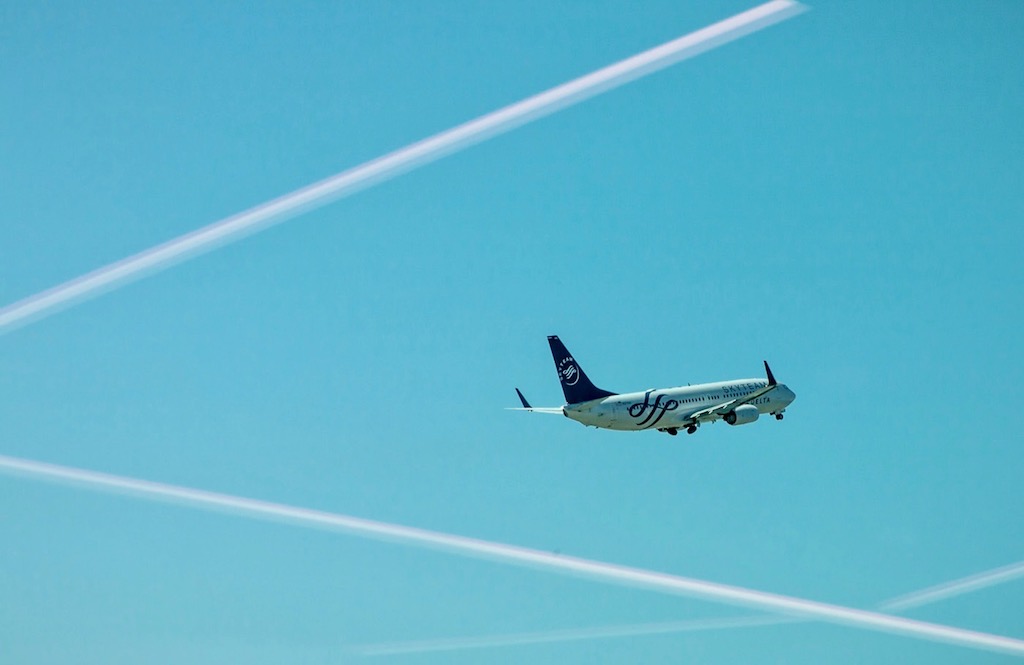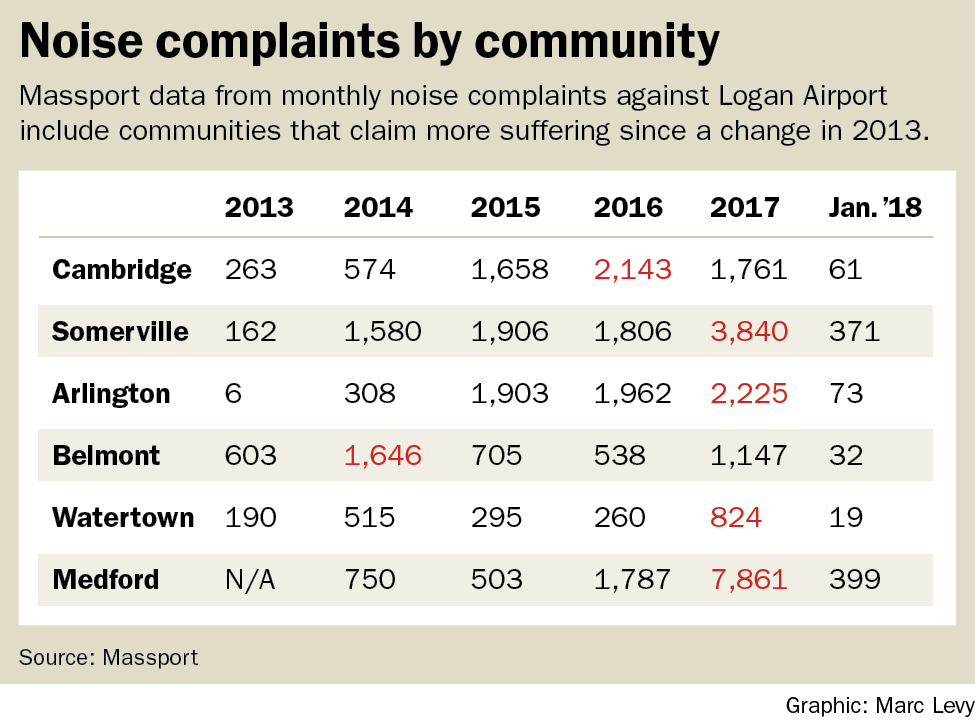Communities enduring Logan airplane noise see cause for optimism in MIT center study

A plane takes off at Boston’s Logan Airport May 30, 2014. The “contrails” are actually reflections from the overhead lights inside the terminal. (Photo: Paul VanDerWerf via Flickr)
A years-long struggle over noise from Logan Airport flight paths is showing results, say citizen activists and Cambridge transportation officials.
In October, the Federal Aviation Administration commissioned the MIT International Center for Air Transportation to study noise levels from the commercial planes and their health effects on neighborhoods below, including Cambridge, Somerville, Arlington, Medford, Belmont and Watertown.
“Just the fact that we got them to acknowledge there’s a problem” was an accomplishment, let alone getting the Massachusetts Institute of Technology study, said Belmont’s Adriana Poole, founder of the community-run coalition Boston West Fair Skies. “We are the first ones in the country.”
It was in June 2013 that the agency implemented a new navigation technology known as Area Navigation, or RNAV, to make flights more efficient and reduce fuel burn. It resulted in a higher concentration of flights in a smaller cluster of neighborhoods, creating what many describe as constant, unbearable noise during certain times of the morning and night. An exacerbating factor was the placement of runway 33L – Logan’s longest, used for the biggest planes headed overseas.
“Logan is a 24/7 operation,” Poole said. “Planes [are taking off] every two minutes for many hours at a time. They can hammer you, for example, for five, six hours,” sometimes at even greater frequency than every two minutes.
Bill Deignan, Cambridge’s transportation planner, said citizen complaints surged after RNAV was put in place, affecting neighborhoods that hadn’t been bothered before. Boston West Fair Skies was one of the first groups to take up this cause and became instrumental in bringing attention to the issue, as well as encouraging the ongoing MIT noise study. Much of its work relies on collaboration with the City of Cambridge in reaching out to local legislators and filing noise complaints to Massport, the state agency operating the airport.
Cambridge complaints of 263 in 2013 more than doubled the next year, then surged into the thousands by 2016 before dropping slightly last year; in Somerville, Arlington, Watertown and Medford, last year was a peak so, with Medford residents registering zero complaints in 2013 but 7,861 in 2017. Somerville’s complaints rose to 3,840 from 162; in Arlington, complaints rose to 2,225 from only six.
“One of the important things is to keep those complaints going,” Poole said. “Without this, the FAA will say we got used to [the situation] and it’s all beautiful and great.”
Poole believes the FAA followed regulatory procedures and did the proper environmental assessments in switching to RNAV – it simply wasn’t enough to predict the level of noise being experienced by residents, and the agency didn’t have alternatives for when the noise became oppressive.
“They didn’t take any shortcuts, they were very step-by-step, done very properly … but at the same time, the impact was significant, because the metric doesn’t necessarily measure the impact on humans,” Poole said.
The MIT study is considered by the affected communities to be a hopeful first step – Susanne Rasmussen, director of environment and transportation planning for Cambridge, lauds “the willingness of Massport and the FAA in particular to find these solutions” – but there are concerns. Some factors in flight noise are simply beyond the control of citizen groups or even state legislators, including the region’s economic growth and the resulting demand for more flights.
One solution to the issue lies in new dispersion techniques for approaching and departing planes, Poole believes: “Disperse [the planes] a little bit more so that it’s not the same people [hearing them and] everybody shares the burden,” she said.
“We just can’t live like this anymore,” she said.
Massport didn’t respond to a request for comment.
This post was updated March 13, 2018, to clarify responses from Adriana Poole, founder of the community-run coalition Boston West Fair Skies.


And the metric they show isn’t about measured noise – its about complaints. And one of the talking points of those that are bothered by flight noise in their perhaps formerly serene upper-middle class neighborhoods was to complain often. 100 motivated people over a summer could log 2000 complaints, just by calling 20 times in the summer, every time they see a plane overhead.
I’d like to see something more concrete than anecdote or data based on the vociferousness of a segment of the population. Part of the reason for this is fuel burn reduction – remember that global warming thing we are all so hyped up about?
Dispersion is not the only solution, just one of a few with good potential for relief for residents living under the new GPS guided flight paths (solutions that are part of block 2) presently studied by the MIT team. Time limitation for this article prevented us from going into more detail.
There is an article in the WSJ (3/14 online version) “A New Antidote for Noisy Airports: Slower Planes” talking about another solution which was voted positively by the MCAC last year and is part of block 1. That concerns reducing the take off speed by a few knots which will translate in a significant noise reduction, models (although only A320 and Boeing 737 were studied) show it could be in the range of a few decibels.
There are other solutions that are being studied and will potentially be considered. The important part is that both Massport and the FAA are engaged in a positive and constructive manner with the citizens living on the ground underneath those concentrated paths and trying to solve the unintended noise problem created by GPS flying (NextGen).
Constant filing of respectful but steady complaints with Massport noise abatement office (617-561-3333) is critical to show impact from dwell and persistence.
Boston West Fair Skies website has additional information on how to file complaints electronically (www.bostonwestfairskies.org).
Although we all understand the need for airspace modernization (due to its relationship to climate change & more) which we fully support, at the same time as humans we are entitled to a minimum of 7 hours of sleep/night in our homes in order to function properly in our daily lives. NextGen as implemented today not only prevents that, but on certain days it prevents us from getting even 5 hours of uninterrupted sleep.
I’m not even exploring the subject of property enjoyment, being able to carry a conversation in your back yard, or having kids play outdoors in an environment free of fine particulates dropped by hundreds of planes flying over the same properties repeatedly, for hours at a time. We’re starting with a basic request: sleep.